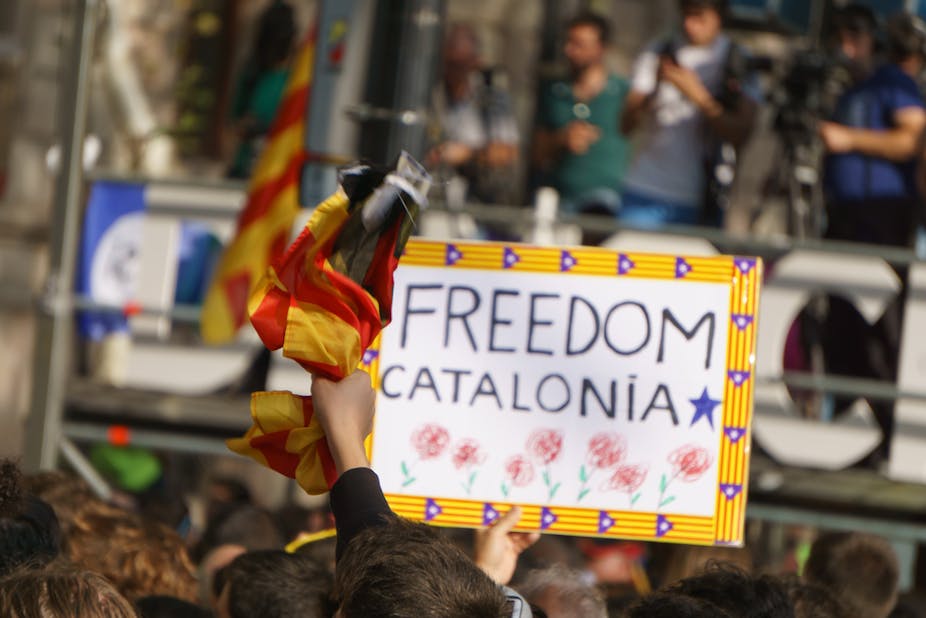In the run-up to the Catalan independence referendum on October 1 – ahead of the police attacks on voters on the day – the lines between protecting the Spanish constitution and curtailing freedom of expression became increasingly blurred. More than 140 websites promoting the referendum have been closed by the Spanish government in recent weeks.
Reports have been rife of tensions between police and journalists – including raids on newspaper offices, broad threats of legal consequences, and an organised protest by journalists against harassment. All this in parallel with the other hostilities from Madrid: threats to arrest Catalan mayors, interference with civic budgets, mass police deployment and now the violence on the day itself. How do these attempts to control communication compare to other referendums – and how concerned should we be?
Ahead of the independence referendums in Scotland in 2014 and Quebec in 1980 and 1995, there were certainly accusations of media bias. In Scotland pro-independence activists gathered outside BBC Scotland a couple of days before the vote to protest against alleged institutional bias in favour of the union with England. Meanwhile, independence campaigners were continually accused of being abusive on social media.
In Quebec’s second referendum, the French-speaking public broadcaster was accused of favouring the pro-independence vote and a parliamentary commission investigated possible bias. But for all the political conflict in these referendums, freedom of expression was never called into question – neither in the actions of the authorities nor by putting up potential legal obstacles to a referendum taking place.
To be sure, there has also been a row about media bias in Catalonia. This has been magnified by the fact that only the pro-independence side is campaigning – the referendum is not recognised by those opposed to independence and is regarded as illegitimate by Madrid.
Media outlets sympathetic to independence look more partisan because they only have one campaign to cover, while unionist outlets positioned against the referendum – which are roughly comparable in number – fall equally foul because they report the situation as a political dispute and not as a campaign at all. This reporting goes way beyond presenting two political options for Catalans. The unionist media talk openly about “the pro-independence offensive”, while the pro-referendum media focus on the “state challenge to Catalonia”.

For example, anti-referendum activists and others gathered outside the Catalan Public Radio Station on September 27 chanting against pro-referendum editorial lines and carrying threatening signs against prominent news anchor Mònica Terribas, whom they regard as one of the key culprits. At pro-referendum events, meanwhile, activists have carried signs saying that the generally unionist Spanish media does not represent them.
Media neutering
The activities of the Spanish authorities have taken things to a whole different level, however. Earlier in September, Spanish police visited or wrote to a number of Catalan news organisations which had aired the official referendum campaign advertisement to give them a letter from the Catalan Superior Court of Justice. The letter, which also went to all Catalan public institutions, did not forbid the adverts or declare them illegal, or even say explicitly that it was illegal to inform people about the referendum.
Instead it warned of possible criminal consequences from helping to bring the referendum about, without specifying what types of actions could fall into that category. The problem with such loose warnings has been the censorship that has come about: the daily newspaper Ara decided not to publish any more campaign adverts, for example.

The Network of Local Television (La Xarxa de Comunicació Local) told its journalists not to ask politicians questions about the referendum until the day after it had taken place. Acting on similar fears, Spanish public mail company Correos stopped distributing the news magazine Omnium Cultural to its subscribers because it contained pro-referendum advertising.
Of the 144 websites that have been blocked, most belong to cultural and political associations campaigning for an independence vote. Fourteen individuals have been called before a judge for copying the codes of some of the sites in question.
The Spanish military police association, the Guardia Civil, meanwhile, is suing Mònica Terribas. It accuses the news anchor of endangering police operations by asking listeners to report on anti-referendum raids by the forces. In all, media observer media.cat has reported than 64 situations where freedom of expression has been affected or disrupted in relation to the referendum.
Faced with such accusations, the Spanish government has said it does not want to restrict freedom of expression in Catalonia. Its actions, it says, are aimed at guaranteeing the order against a referendum which was laid down by the Spanish constitutional court a few weeks ago.
But even before the outbreak of referendum day violence, Spain already found itself in territory for which it is hard to find comparisons in the West. Article 10 of the European Convention on Human Rights, to which Spain is of course a signatory, lays down the principle of freedom of expression quite clearly. It talks about the right of people to “receive and impart information and ideas without interference by public authority and regardless of frontiers”.
Yet little or nothing has been said by the international community in this regard. The situation is troubling to say the least. If there are no consequences, particularly in light of the latest developments on the ground, it will set a dangerous precedent.

